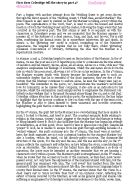By the 6th stanza, the guilt felt by the Mariner is so overwhelming that he is unable to pray, ‘I looked to Heaven, and tried to pray’. The constant semantic fields relating to religion in this stanza, ‘prayer’, ‘saint’, suggest to the reader that the Mariner is trying to bring himself closer to God; it also indicates that the Mariner has begun his attempt at redemption, as at this point, it’s so hard for him to ignore his own guilt. Despite his ‘prayer’ to God, he is unable to escape from his guilt through anything because of a ‘wicked whisper’. His guilt continues into the 7th stanza, ‘the dead were at my feet’, here, the dead mariners are not only a physical burden for the Ancient Mariner but also a burden, within his mind, on his already guilty concious. The chiasmus-like structure of the quote, ‘for the sky and the sea, and the sea and the sky’, in the 7th stanza reflects the mariner’s self-reflection as he’s telling the story, consolidating his role as storyteller. The deviation of the ballad form also establishes a re-focus of narration; the quote may be intended as another reminder that we are hearing a character’s story within a poem. The Mariner’s guilt is strengthened, in the 8th stanza, when he states that the accusatory looks of the mariners, as they died, have ‘never passed away’, not only have the expressions of the mariners stayed with him, but the general guilt has remained with him. The ‘cold sweat’ that ‘melted from [the dead mariners’] limbs’ makes them seem almost life-like, the oxymoronic language helps to convey their liminal state. In the 8th stanza, the mariner states that the ‘curse in a dead man’s eye’ is ‘more horrible than that’ of ‘an orphan’s curse’, reflecting the extent of blame received by the Mariner, as well as his general guilt and shame. His suffering is emphasised by Coleridge’s intertextual reference to the bible, ‘seven days, seven nights, I saw that curse’, as there is an implication that God is punishing the Mariner for destroying one of His own creations, the Albatross. Also, the quote suggests that the Mariner is becoming closer to both the idea of God, and God, Himself.
The 10th stanza in part 4 marks a moment of change, as the Mariner doesn’t acknowledge his guilt. Coleridge also communicates the potential for change, as he returns back to the original ballad form from the sectet, implying that some sort of transition is about to occur. The celestial imagery used by Coleridge in the stanza, ‘moon’, ‘sky’, and ‘star’, reinforces the idea of transition, the sky and stars commonly symbolise hope and create a sense of positive anticipation, as well as the moon, which is often symbolic of change. The idea of transition is supported further by Coleridge’s use of gerund verbs, ‘moving’, ‘going’, in the stanza. Arguably, they imply that the Mariner is moving on from his previously overwhelming guilt and instead, embracing new ideas of nature, God and humanity in general. Indeed, in the 12th stanza, we see that the Mariner’s appreciation of nature is able to distract him from his strong feelings of guilt, ‘the water-snakes…moved in tracks of shining white’. The word, ‘tracks’, creates a contrast with the directionless mariner, he has been unable to connect with God and nature until now, when he sees the water-snakes and their ‘tracks’ offer him some sense of clarity and purpose. The 11th, 12th and 13th stanzas are all quintets; together they are able to reflect the Mariner’s transitional period into the glory of nature, triggered by ‘the moving moon’ in the 10th stanza.
In the 13th and 14th stanzas, we see the Mariner’s newfound complete adoration for nature. Coleridge uses regal imagery to convey the mariner’s love for nature, and to reflect the change brought by the moon, ‘rich attire’, ‘glossy green…and velvet’. Additionally, in the 14th stanza, despite his description of the water-snakes regal aspects he is unable to express the beauty of the products of nature; ‘no tongue their beauty might declare’. His newfound admiration for nature has made him realise that the true beauty of nature is beyond the expression of mankind, and as he is humbled by religion and nature he believes that only God is capable of creating such things, ‘a spring of love gushed from my heart and I blessed them unaware.’
The part ends with him finally being in touch with God and religion, ‘I could pray’, meaning that he is more connected to a high power, God. There is also a signature reference to the Albatross, ‘[it] fell off and sank like lead into the sea.’ Albatross represents the burden, and the simile suggests that the burden of blame has finally been released. There is also the assumption that the Albatross is now back in contact with its natural habitat, the sea, a part of nature. The enjambment in the line creates and emphasises a more visual interpretation of the Albatross parting the Mariner’s neck, as it reflects the bird’s downward movement. By the end of the part, much of the Mariner’s initial guilt has been abandoned or at least temporarily distracted by nature. We also get the impression that the curse is over for the Mariner, as he is now starting to acknowledge and admire world’s beauty, however this is just Coleridge lulling us into a false sense of security, as sadly, the curse is far from over.








